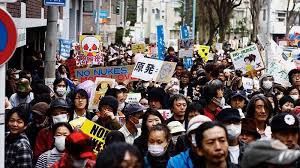The World Bank says in a report released Tuesday that the war in Ukraine will affect Asia’s economies in the coming months due to disruptions in commodity supplies, financial constraints, and increased pricing.
Slower growth and greater poverty are expected in the Asia-Pacific area this year, according to the research, as “multiple shocks” compound problems for people and businesses.
The region’s growth is expected to be 5%, down from the earlier expectation of 5.4 percent. According to the “low case” scenario, growth will fall to 4%. After many economies experienced downturns with the advent of the pandemic, the area enjoyed a return to 7.2 percent growth in 2021.
China, the region’s largest economy, is expected to grow at a rate of 5% per year, down from 8.1 percent in 2021, according to the World Bank.
According to the paper, Russia’s invasion of Ukraine has pushed up prices for oil, gas, and other commodities, reducing consumer purchasing power and burdening businesses and governments already dealing with extremely high debt levels as a result of the pandemic.
The development financing agency advised governments to remove trade and service barriers so that additional chances for trade can be taken advantage of, as well as to eliminate fossil fuel subsidies to encourage the adoption of more green energy technology.
“The series of shocks implies that people’s growing economic hardship will have to contend with their governments’ dwindling financial capability,” said Aaditya Mattoo, the World Bank’s East Asia and Pacific Chief Economist. “A mix of fiscal, financial, and trade changes could relieve poverty and mitigate risks.”
The research identified three major possible shocks for the region: the war, monetary policy changes in the United States and other countries, and a Chinese slowdown.
While raising interest rates makes sense for cooling the economy and containing inflation in the United States, most of Asia is still recovering from the pandemic. It warned that altering policies could result in currency outflows and other financial consequences for countries like Malaysia.
Meanwhile, COVID-19 outbreaks might wreak havoc on China’s already sluggish economy, prompting lockdowns like the one in Shanghai, the country’s most populous city. This is expected to have an impact on several Asian countries whose trade is reliant on Chinese demand.
According to the research, “these shocks are likely to amplify current post-COVID issues.” “Real wages will drop even further as prices skyrocket,” according to the 8 million homes whose members slid back into poverty during the pandemic.
Regional economies fared better during the 2021 Delta variant coronavirus waves than during the early months of the pandemic in 2020, according to the analysis, owing to fewer restrictions and extensive immunizations that helped limit the intensity of the outbreaks.
According to the report, countries with a 1 percentage point greater vaccination rate grew faster on average.

















